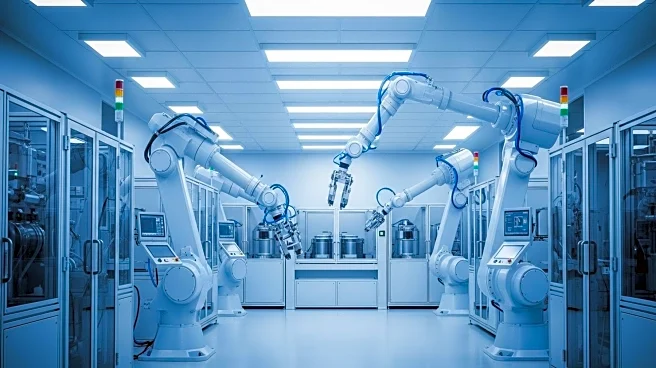What's Happening?
The pharmaceutical manufacturing industry is facing significant challenges in adapting to rapid advancements in drug development. A new white paper titled 'Future Proof Production: Implementing AI in Pharmaceutical Manufacturing' by Zühlke and the University of St. Gallen highlights the potential of artificial intelligence (AI) to transform manufacturing processes. The paper identifies six key issues affecting the industry, including quality control complexities, production inflexibility, and regulatory challenges. It provides a framework for developing and validating AI in GxP-regulated environments, supported by case studies from leading pharmaceutical companies. The insights are based on academic research and practical experience, emphasizing AI as a competitive necessity for the industry.
Why It's Important?
The adoption of AI in pharmaceutical manufacturing is crucial for enhancing efficiency, reliability, and robustness in the industry. As global disruptions and regulatory complexities increase, AI offers solutions to streamline production processes, improve quality assurance, and optimize resources. This transformation is vital for maintaining competitiveness and ensuring the industry's resilience amid geopolitical instability and technological change. Companies that successfully implement AI can gain a significant advantage, potentially leading to cost savings, improved product quality, and faster time-to-market for new drugs.
What's Next?
Zühlke will host a panel discussion at the World Health Summit in Berlin from October 12th to 14th, bringing together global health and industry experts to explore the future of pharmaceutical manufacturing. This event will provide a platform for discussing how AI can help the industry remain resilient and adapt to rapid technological advancements. Stakeholders in the pharmaceutical sector are likely to closely monitor these developments, as successful AI integration could set new industry standards and influence future regulatory frameworks.
Beyond the Headlines
The integration of AI in pharmaceutical manufacturing raises ethical and regulatory considerations, particularly concerning data privacy and the validation of AI-driven processes. As AI becomes more prevalent, there will be a need for clear guidelines and standards to ensure transparency and accountability. Additionally, the shift towards AI-driven manufacturing may impact the workforce, necessitating new skills and potentially leading to job displacement. Companies will need to address these challenges to ensure a smooth transition and maintain public trust.








